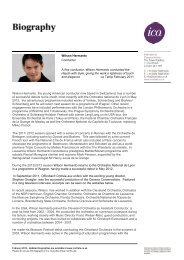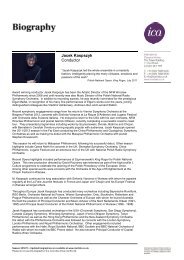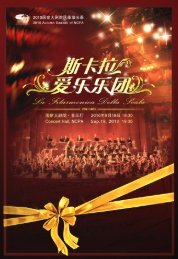to download the DVD booklet. - International Classical Artists
to download the DVD booklet. - International Classical Artists
to download the DVD booklet. - International Classical Artists
You also want an ePaper? Increase the reach of your titles
YUMPU automatically turns print PDFs into web optimized ePapers that Google loves.
GUSTAV MAHLER 1860–1911<br />
Symphony No.5 in C sharp minor<br />
Part I<br />
1 I Trauermarsch: In gemessenem Schritt. Streng. Wie ein Kondukt 14.42<br />
2 II Stürmisch bewegt, mit größter Vehemenz 15.29<br />
Part II<br />
3 III Scherzo: Kräftig, nicht zu schnell 18.21<br />
Part III<br />
4 IV Adagiet<strong>to</strong>: Sehr langsam 11.22<br />
5 V Rondo-Finale: Allegro 16.12<br />
Producer: Donald Sturrock<br />
Direc<strong>to</strong>r: Kriss Rusmanis<br />
Recorded: Royal Festival Hall, London, 13 December 1988<br />
Broadcast: 22 December 1991<br />
© BBC 1991<br />
London Philharmonic Orchestra<br />
Leader: David Nolan<br />
KLAUS TENNSTEDT<br />
For ICA Classics<br />
Executive Producer: Stephen Wright<br />
Head of <strong>DVD</strong>: Louise Waller-Smith<br />
Executive Consultant: John Pattrick<br />
Music Rights Executive: Aurélie Baujean<br />
ICA Classics gratefully acknowledges <strong>the</strong> assistance of Inge Tennstedt<br />
<strong>DVD</strong> Studio Production<br />
<strong>DVD</strong> Design & Development: msm-studios GmbH<br />
Producer: Johannes Müller<br />
Project Management: Jakobus Ciolek<br />
Screen Design: Hermann Enkemeier<br />
<strong>DVD</strong> Authoring: Benjamin Fritz<br />
Audio Res<strong>to</strong>ration & Re-Mastering: Chris<strong>to</strong>ph Stickel<br />
Video Res<strong>to</strong>ration: Michael Hartl<br />
<strong>DVD</strong> Packaging<br />
Product Management: Helen Forey & Harry Robson for WLP Ltd<br />
Booklet Editing: WLP Ltd<br />
Introduc<strong>to</strong>ry Note & Translations ç 2011 <strong>International</strong> <strong>Classical</strong> <strong>Artists</strong> Ltd<br />
Cover Pho<strong>to</strong>: BBC<br />
Art Direction: Georgina Curtis for WLP Ltd<br />
π 2011 BBC, under licence <strong>to</strong> <strong>International</strong> <strong>Classical</strong> <strong>Artists</strong> Ltd<br />
TENNSTEDT CONDUCTS MAHLER SYMPHONY NO.5<br />
In <strong>the</strong> great renaissance of interest in <strong>the</strong> works of Gustav Mahler, none of his symphonies has<br />
enjoyed greater popularity than his Fifth, <strong>the</strong> first of <strong>the</strong> triptych of purely instrumental works<br />
that marks his ‘middle period’ as a symphonist. The inclusion of <strong>the</strong> beautiful Adagiet<strong>to</strong> for harp<br />
and strings in <strong>the</strong> soundtrack of Visconti’s Death in Venice may partially account for this, but <strong>the</strong><br />
appeal of <strong>the</strong> piece transcends that demotic vehicle, and conducting <strong>the</strong> piece successfully is<br />
something of a rite of passage for modern-day conduc<strong>to</strong>rs. This symphony’s constant sense of<br />
dramatic Sturm und Drang, plus its thrilling and unequivocally affirmative conclusion, makes it a<br />
natural crowd-pleaser.<br />
Between 1977 and 1986, Klaus Tennstedt recorded all <strong>the</strong> Mahler symphonies, plus Das Lied von<br />
der Erde (a symphony in all but name), with <strong>the</strong> London Philharmonic Orchestra. The first three<br />
of those recordings were made in <strong>the</strong> pre-digital era, when Tennstedt was yet <strong>to</strong> formalise his<br />
relationship with <strong>the</strong> LPO (he became its principal guest conduc<strong>to</strong>r in 1980 and its music direc<strong>to</strong>r<br />
in 1983). A recording of <strong>the</strong> First Symphony in 1977 left critics underwhelmed, but recordings<br />
of <strong>the</strong> Fifth and Ninth, made in 1978 and 1979 respectively, won considerable plaudits. The Fifth<br />
was granted three stars in <strong>the</strong> authoritative Penguin Guide, which rightly praised an ‘outstanding<br />
performance, thoughtful on <strong>the</strong> one hand, warm and expressive on <strong>the</strong> o<strong>the</strong>r’.<br />
The Klaus Tennstedt of a decade later was an entirely different person, however, as <strong>the</strong> remarkable<br />
concert on this <strong>DVD</strong> demonstrates. A heavy smoker, in 1986 he was diagnosed with cancer of <strong>the</strong><br />
throat and began a fierce course of radio<strong>the</strong>rapy. Having seemingly conquered <strong>the</strong> disease, he<br />
attempted a comeback at <strong>the</strong> 1987 Proms, but collapsed during a rehearsal and had <strong>to</strong> be replaced.<br />
He resigned at once as music direc<strong>to</strong>r of <strong>the</strong> orchestra and did not conduct it again until May 1988.<br />
Fate had been peculiarly cruel <strong>to</strong> Tennstedt. Although he was <strong>the</strong> most unlikely of superstars – he<br />
possessed little or no command of social etiquette, evinced not <strong>the</strong> slightest interest in <strong>the</strong> glittering<br />
baubles of fame, and deployed a conducting technique that baffled most onlookers – in his late<br />
forties that is precisely what he started <strong>to</strong> become. Until 1971 he was trapped in <strong>the</strong> so-called<br />
German Democratic Republic, conducting provincial orchestras, and his big break came at last in<br />
1974, when he conducted <strong>the</strong> Bos<strong>to</strong>n Symphony Orchestra. London followed in 1976 and, in a<br />
profession where elderly practitioners are venerated not spurned, Tennstedt seemed set for decades<br />
of prominence, conducting <strong>the</strong> great orchestras of <strong>the</strong> world in <strong>the</strong> music he loved – Bruckner and<br />
Dvořák, Mozart and Beethoven, Brahms and Mahler.<br />
Of all <strong>the</strong>se, it was Mahler that brought out <strong>the</strong> best in Tennstedt. Although he had come relatively<br />
late <strong>to</strong> Mahler, as he had <strong>to</strong> prominence – <strong>the</strong>se works were banned under <strong>the</strong> Nazis and rarely<br />
performed under <strong>the</strong> Communists – Klaus Tennstedt got as close <strong>to</strong> <strong>the</strong>m as anyone ever has. He<br />
himself believed his affinity <strong>to</strong> Mahler could be explained by <strong>the</strong> fact <strong>the</strong>y had both led difficult and<br />
complicated lives, characterised by sudden and violent relocations and changes of direction. Every<br />
2<br />
3
















